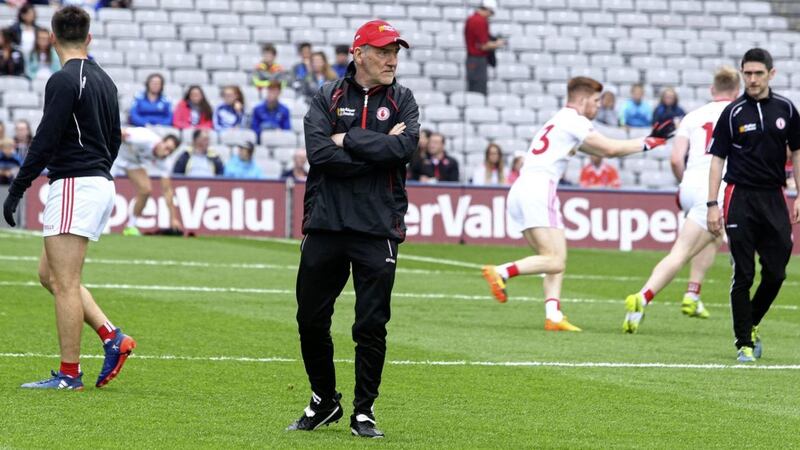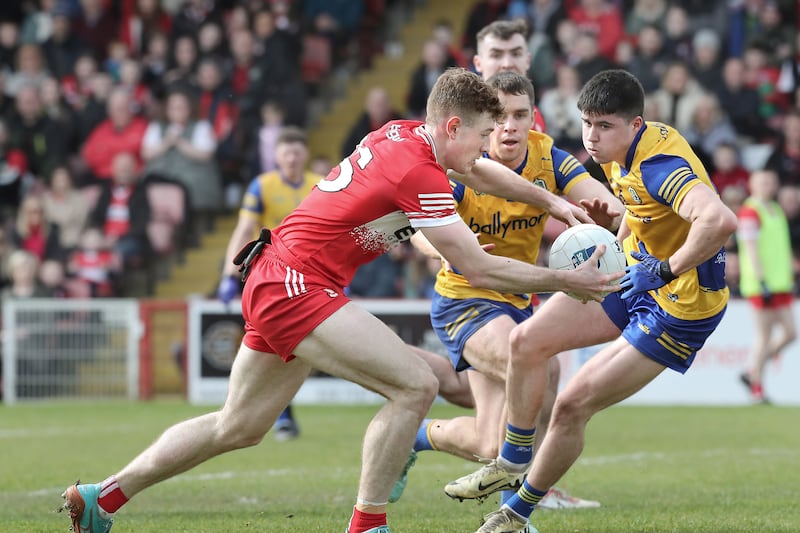WHAT have Sparta’s King Leonidas, El Cid, Robert E Lee, Douglas MacArthur and Mickey Harte got in common?
Against all the odds they have fought wars, of different sorts, and inscribed their names in history.
The key reason is they are supreme strategists; people skilled in planning and implementing actions.
At minor grade, Harte managed to gel one of the most talented bunch of minors ever witnessed and at the same time got them playing to his system. He repeated this feat at U21 grade before merging them with the likes of Peter Canavan to win not only their county’s first All-Ireland title but two more All-Ireland senior titles and to secure their place in history as one of the greatest teams of their generation.
Harte’s new team is on an upward curve, lessons are learned following each outing, confidence in their system and in the collective grows. They are back on the big stage again.
In a season when several inter-county managers have received their P45s and many more are on borrowed time, I ask why do more things go the way of the winning manager on matchday? Why is it some are praised and others scorned? Managers delegate so much of their work because to do it all is impossible.
Delegation is an absolute necessity of sound management. Managers delegate responsibility for the pre-match meal, journey planner and so on to the logistics person, the balls and jersey to the kitman, the pre-match warm up and rotation of subs warm-up to the trainer.
That’s not to say that the manager can switch off – he can’t. Modern day mangers are miked up to a person of trust in the stand, often a member of his backroom team. This channel is shared with coaches and perhaps the doctor or physio.
Three or four people can be having heated debates, each putting in their tuppence worth on who is playing well or who should be called ashore. The debates are riddled with personal bias and emotion.
Then there is the statistician who is blurting out lines like “our tackle count is down, we need to do something about this”, as if it that has some purposeful meaning.
Airwave chatter diminishes a manager’s head space. It is bad enough watching a game without listening to a group of people debating in your ear what in your view might as well be an entirely different game to the one you are watching.
For me, earpieces are a huge distraction for any manager.
The best managers have a solution to this issue.
It may be that the aforementioned airwave debate happens unknown to them but the key issues and proposed solutions are filtered to them via a trusted third party. Another decision which divides managers is where they should be located; pitchside or in the stand. Some managers opt to walk the line, others spend large parts of their time standing motionless, whereas some, like Mayo’s Stephen Rochford, sits high in the stand for the first half and stands pitchside after the short whistle. I’m sure there is a logic to this method which he feels serves him well but often such a change can bring with it a sense of panic felt by the players.
Equally, a manager pitchside being consumed by the emotion of the match morphs into irrelevance.
For me the critical role of a manager is to strategise.
In order to do this effectively, he must have the head space to think clearly and rationally. The guy in the pub will talk about the ‘shrewd manager’ – it is the same person.
Mickey Harte does this on every big day. The evidence is there to see – taking Peter Canavan off in 2003 only to put him on again for the final 10 minutes, the honing of swarm tactics of 2005 to counter the Kingdom’s midfield height advantage, the reintroduction of Stephen O’Neill into the panel prior to the 2008 final and the ability to make impact switches at crucial times in the recent Championship matches.
Only the manager should give direction to a sub as he enters the fray yet how often do you see a coach or backroom team member giving the sub the pep talk? There can be six substitutions by each team; that’s 12 changes per game. The manager must tell his player what he wants him to do. Without clarity of role, confusion reigns. He must also counter the opposing managers every move. Without the head space to plot and counterplot, the threat of failure looms. The good managers instruct their players. They don’t shout or become overly animated, the final words are not a pep talk. That’s the roles of the captain or the team’s leaders. Footballers often say they go to war. For me the good managers guide their team through wars. Yes, every team needs to have talented players, just like any good army throughout history had talented fighters, but what is most important is a general who understands his role and prioritises the important tasks. Increasingly in the GAA, the manager is the most important person.






